Mom Follows the USS Theodore Roosevelt (CVN-71)
|
|
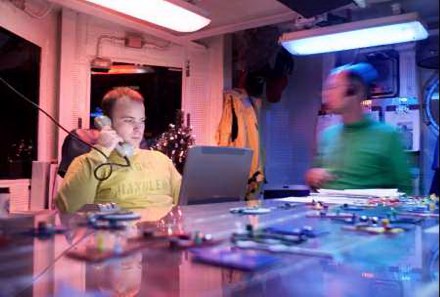 Ens. Craig Hartsoc, from Springfield, Va., the handler who is in charge of all night time launches and recovery of aircraft aboard the USS Theodore Roosevelt speaks to the bridge in front of a table representing the flight deck and wood pieces representing various planes during night time flight operations in support of Operation Swift Freedom in the Arabian Sea, Wednesday, Nov. 28, 2001. (AP Photo/Ed Wray/Pool) Ens. Craig Hartsoc, from Springfield, Va., the handler who is in charge of all night time launches and recovery of aircraft aboard the USS Theodore Roosevelt speaks to the bridge in front of a table representing the flight deck and wood pieces representing various planes during night time flight operations in support of Operation Swift Freedom in the Arabian Sea, Wednesday, Nov. 28, 2001. (AP Photo/Ed Wray/Pool) |
|
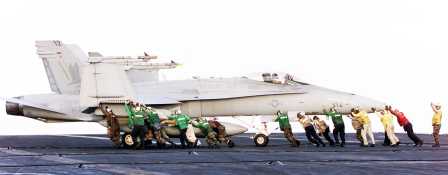 RETRANSMISSION TO CORRECT MODEL DESIGNATION OF PLANE--EDS NOTE: PICTURE MAY HAVE BEEN REVIEWED AS IT WAS SENT VIA NAVY COMMUNICATIONS--Crew members of the USS Theodore Roosevelt push back a Navy F-18 during flight operations Wednesday, Nov. 28, 2001 in the Arabian Sea. Since deployment in September, the ship has launched over 1,000 sorties in support of Operation Swift Freedom. (AP Photo/Ed Wray) RETRANSMISSION TO CORRECT MODEL DESIGNATION OF PLANE--EDS NOTE: PICTURE MAY HAVE BEEN REVIEWED AS IT WAS SENT VIA NAVY COMMUNICATIONS--Crew members of the USS Theodore Roosevelt push back a Navy F-18 during flight operations Wednesday, Nov. 28, 2001 in the Arabian Sea. Since deployment in September, the ship has launched over 1,000 sorties in support of Operation Swift Freedom. (AP Photo/Ed Wray) |
|
 Consumer advocate Clark Howard helps Petty Officer First Class Rob Kearns, of Kennesaw, Ga., with an investment question during his daily radio show at the WSB Radio studios in Atlanta, Wednesday, Nov. 28, 2001. Kearns, was calling from the U.S.S. Theodore Roosevelt. (AP Photo/John Bazemore) Consumer advocate Clark Howard helps Petty Officer First Class Rob Kearns, of Kennesaw, Ga., with an investment question during his daily radio show at the WSB Radio studios in Atlanta, Wednesday, Nov. 28, 2001. Kearns, was calling from the U.S.S. Theodore Roosevelt. (AP Photo/John Bazemore) GEE!! While some guys are calling radio shows - there are mothers who would give almost anything to hear the voice of their loved ones! HINT! HINT!!
JDJ Call home - your MOTHER wants you!
|
|
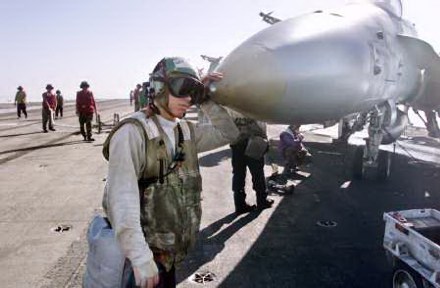 EDS NOTE: THIS PICTURE MAY HAVE BEEN REVIEWED AS IT WAS SENT VIA NAVY COMMUNICATIONS--Crew member Joseph Szocki from Fort Lauderdale, Fla., rests on the nose of a fighter aboard the USS Theodore Roosevelt in the Arabian Sea Thursday Nov. 29, 2001 after a night of flight operations. Since deployment in September, the ship has launched over 1,000 sorties in support of US led military operations in Afghanistan. (AP Photo/Ed Wray) EDS NOTE: THIS PICTURE MAY HAVE BEEN REVIEWED AS IT WAS SENT VIA NAVY COMMUNICATIONS--Crew member Joseph Szocki from Fort Lauderdale, Fla., rests on the nose of a fighter aboard the USS Theodore Roosevelt in the Arabian Sea Thursday Nov. 29, 2001 after a night of flight operations. Since deployment in September, the ship has launched over 1,000 sorties in support of US led military operations in Afghanistan. (AP Photo/Ed Wray) |
|
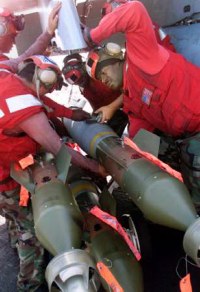 Crew unload ordinance from a fighter aboard the USS Theodore Roosevelt November 29, 2001. Top Taliban and al Qaeda leaders are increasingly cut off from their troops, the Pentagon said Wednesday, a day after U.S. precision-guided bombs blasted a leadership compound near Kandahar, Afghanistan. REUTERS/Ed Wray/Pool Crew unload ordinance from a fighter aboard the USS Theodore Roosevelt November 29, 2001. Top Taliban and al Qaeda leaders are increasingly cut off from their troops, the Pentagon said Wednesday, a day after U.S. precision-guided bombs blasted a leadership compound near Kandahar, Afghanistan. REUTERS/Ed Wray/Pool |
|
Thursday November 29 2:53 PM ET Classes Held on Aircraft Carrier By HRVOJE HRANJSKI, Associated Press Writer
ABOARD THE USS THEODORE ROOSEVELT (AP) - After long hours fixing airframes on F/A-18C Hornets bombing Afghanistan, Marine Cpl. Scott Gordon has just enough energy left to wash the grease off his arms and take his seat in a class now discussing Alexander Hamilton, an American statesman in the 18th century.
The college classes that Gordon and 125 other sailors and Marines are taking aboard the aircraft carrier could not have come at a busier time. But his two-month course on U.S. diplomatic history was oversubscribed when it started at the beginning of November.
``The class has been an eye-opener. I hardly have time for a bowl of cereal, but I know it will put me ahead, whether I stay or leave to go to college,'' said Gordon, 25, of Madison, Wis.
Professor Jeff Gardner, one of four Navy-contracted civilian instructors aboard the USS Theodore Roosevelt, does everything he can to make up for the fact that the carrier in the Arabian Sea has no academic library, no audiovisual gadgets and Internet access that is down for most of the day.
Mostly he talks, trying to keep his audience awake and responding during a class that meets from 1 o'clock to 3 o'clock - in the morning.
``If the students are not interested in what the current situation is, it's because they don't know what questions to ask. They are very comfortable with the company line,'' said Gardner, 44, of Las Cruces, N.M. ``If that's what the government said happened, that's what happened. If the Taliban are bad, the Taliban are bad.''
But he added, ``When they start asking questions, that's where they do jump in. Then they are awake and they go, 'Hey, OK, I never thought of it that way before.'''
Lecturing aboard Navy ships for the last seven years, civilian instructors have been free to tailor their programs without government interference, Gardner said. He is unlikely to be accused of toeing the company line.
``American foreign policy is about self-interest and power, not ethics. It's good to be selfish,'' he told a baffled class. ``Why are we interested in Uzbekistan or Tajikistan? Because of oil - not because we like them.''
Master Chief Kenneth Reed, who is in charge of the classes, suggested they expose students to a different perspective and a change from the military atmosphere in which the last thing they are expected to do is question authority.
``Everybody has an opinion and is entitled to an opinion,'' he said. ``But I don't think most people are comfortable with speaking their opinion'' in the armed forces.
``We get them to think in a different way that's not the right way to think, but they have experience and exposure to thinking from a different temple,'' said Reed, 44, of Fall River, Mass. ``Diplomatic history is a class where rules are different from our day-to-day lives.''
There are also classes in math, English, criminal justice, psychology, psychiatry and speech. Depending on what the students are majoring in, students can earn credits for further studies.
For Gardner, who has been jumping from one ship to another for four years, teaching sailors and Marines is a way of giving something back.
``When I was their age, I joined the Navy and I took my first college class aboard the ship,'' he said. ``I took every class that I could and it was wonderful, and then I went to college and got back and said, 'I'd be happy to do the same for them.''
|
|
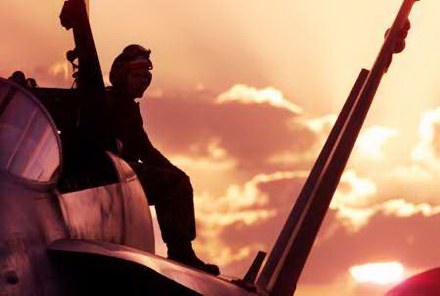 EDS NOTE: THIS PICTURE MAY HAVE BEEN REVIEWED AS IT WAS SENT VIA NAVY COMMUNICATIONS --A sailor aboard the USS Theodore Roosevelt rests on a fighter plane as the sun rises after a night of flight operations in the Arabian Sea Thursday, Nov. 29, 2001. Since deployment in September, the ship has launched over 1,000 sorties in support of US led military operations in Afghanistan. (AP Photo/Ed Wray) EDS NOTE: THIS PICTURE MAY HAVE BEEN REVIEWED AS IT WAS SENT VIA NAVY COMMUNICATIONS --A sailor aboard the USS Theodore Roosevelt rests on a fighter plane as the sun rises after a night of flight operations in the Arabian Sea Thursday, Nov. 29, 2001. Since deployment in September, the ship has launched over 1,000 sorties in support of US led military operations in Afghanistan. (AP Photo/Ed Wray) |
|
Thursday November 29 3:33 AM ET Warplanes Target Taliban, al-Qaida By HRVOJE HRANJSKI, Associated Press Writer
ABOARD THE USS THEODORE ROOSEVELT (AP) - U.S. warplanes catapulted off an aircraft carrier in the Arabian Gulf toward Afghanistan (news - web sites) on Thursday, taking specific aim at the al-Qaida terror network and allied Taliban leaders.
``We've driven the al-Qaida bunch into hiding and (the caves) are one of the places where they may be. We want to go after the leadership, that's where the center of gravity is,'' USS Theodore Roosevelt Rear Adm. Mark Fitzgerald said, without disclosing specific targets.
U.S. Navy F-14 Tomcats and the Marine Corps Hornets were leading Thursday's airborne hunt for Osama bin Laden, his al-Qaida cohorts and leaders of Afghanistan's crippled Taliban regime, including supreme leader Mullah Omar.
With sights set on top officials from both groups, U.S. warplanes Tuesday bombed a compound near the Taliban's spiritual center, Kandahar, believed used by senior Taliban or al-Qaida figures, the Pentagon (news - web sites) said. It was unclear if any were killed.
The U.S.-led campaign, which was launched Oct. 7, has killed several lieutenants of bin Laden, the prime suspect in the Sept. 11 attacks on the United States. Mohammed Atef, one of Saudi dissident bin Laden's top two advisers, was killed in a CIA (news - web sites)-assisted U.S. airstrike around Nov. 14.
Two other leading al-Qaida figures - Egyptians Mohammed Salah and Tariq Anwar al-Sayyid Ahmad - are believed dead after U.S. bombing in early November near Khowst in eastern Afghanistan, officials said.
U.S. fighter jets were called in to provide close air support during a three-day Taliban prison riot in Mazar-e-Sharif, in which hundreds of fighters loyal to bin Laden killed. CIA officer Johnny M. Spann was also killed in the uprising, officials confirmed.
On Monday, five U.S. service members were also injured during the riot after they called in a bombing mission and a bomb exploded too close to them, the Pentagon said.
``We've had an awful lot of instances of doing close air support where the people are in danger of being overrun,'' Fitzgerald said. ``As far as protecting people on the ground, that's a very difficult challenge when you have people on the ground ... (and) people providing close air support to them. That's probably the most difficult mission that our pilots are flying.''
The Roosevelt crew has so far launched more 3,000 aircraft, officials said. According to Fitzgerald, the progress on the battlefield has been a surprise.
``We first took out their strategic defenses, their operational reserves, their supplies, their transportation and those kind of things,'' he said of the Afghan targets. ``Then we went after their people, the command bunkers. All of a sudden, the whole thing broke loose. We're obviously very happy about that.''
For the last two weeks, the planes have been selectively going after key Taliban and al-Qaida defenses ``so that we can enable the ground forces to move in and take over,'' he said. ``Having been at sea for 75 straight days, people are tired, but tired doesn't equate to a loss of morale.''
The Roosevelt battle group is one of three in the Arabian Sea. The other two are led by the carriers USS Kitty Hawk and the USS Carl Vinson.
|
|
|
|